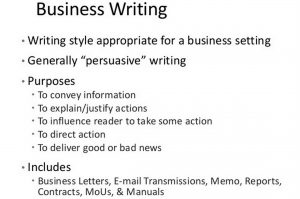Writing is Communication
Wikipedia defines writing as a medium of human communication that involves the representation of a language with symbols. Read more at http://www.wikipedia.org/wiki/writing. So as you can see, writing is a vital part of communication. Good writing skills will help you to clearly communicate your message.
Communication through writing is essential in the modern world, especially as we participate in what is commonly referred to as the information age. In fact, it is the most common form of business communication, especially technical business writing which focuses on products and services, how to manufacture them, use them, market them and even package and deliver them.

Technical Writing vs Business Writing
As formerly stated, every job requires good writing skills. Technical and Business writing skills are two of the most widely used writing methods. They are usually confused with one and majorly because they have somewhat an intertwined goal, which is simplifying complex ideas. Prof. Prathap Haridoss of the department of MME, ITT Madras, gave a good insight into technical writing. Here’s a link to the video https://youtube.com/watch?v=NM53k7x_jj.
Let’s now look at how these two styles of writing differ from each other:
Definition and examples
Business Writing: Business writing is a type of writing that seeks to educate an audience of a particular line of work. It is a piece of writing that provides relevant information to help educate its audience on a topic or topics that will benefit their profession. It may include emails, reports, business letters, etc. On the other hand, technical writing is more like a how-to guide. It is written for the sole purpose of educating the reader on a particular subject, giving instructions to the reader or even, written to give directions giving directions to the reader. Examples of technical writing includes user guides and manuals, policy manuals, reports of analysis, etc.
Types
Business Writing: There are four major types here and they are: Informational Business Writing, Instructional Business Writing, Persuasive Business Writing and Transactional Business.
Technical Writing: The major categories of Technical Writing are: Traditional Documentation, API Documentation, Science Papers (Research and Report) and Technical Marketing Documentation.
Features
Business Writing: In business writing, strict attention must be paid to the form, the appropriate tone must be used, your audience must always be on your mind and above all, a good business writing must be clear and as concise as possible.
Technical Writing: A good technical writing must have contents that are factually correct, appropriate for the intended audience, Concise, Comprehensive, Logical and Sequential, Action-oriented, and organized.
Audience
Business Writing: Generally, in business writing, we assume you are writing for an audience that understands the industry or function at a management level but is more interested in the broader impact of the topic than the detail of the topic itself. Consequently, less jargon is used. Furthermore, care is taken while choosing detail to ensure that it is only topics that aim to provide clarity on its relevance to commercial context are picked.
Technical Writing: Technical Writing is mainly aimed at an audience with a base knowledge of the technical topic you are writing about or at least a desire to learn it in full. As a result, technical writing is allowed to go deep into details and also use language and jargon specific to the topic you are writing.
In conclusion, both the technical writing and business writing pay attention to the target audience while clearly communicating information in a well-defined manner, but these styles are not the same.
